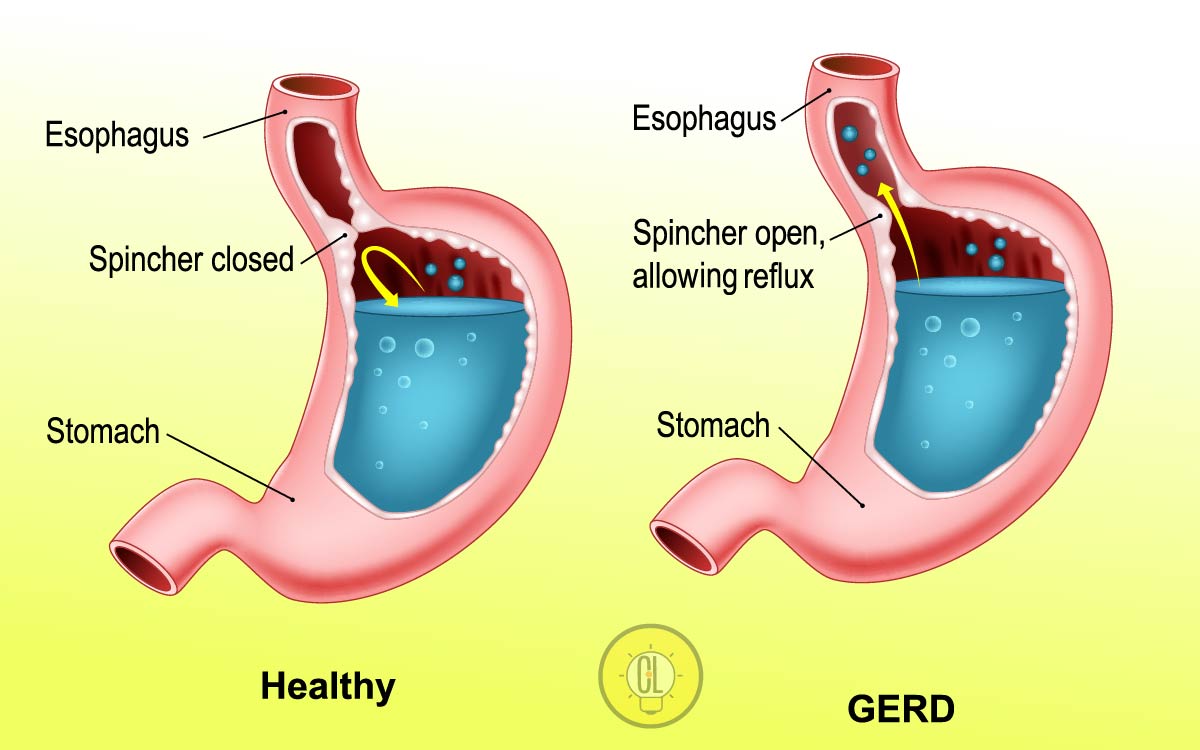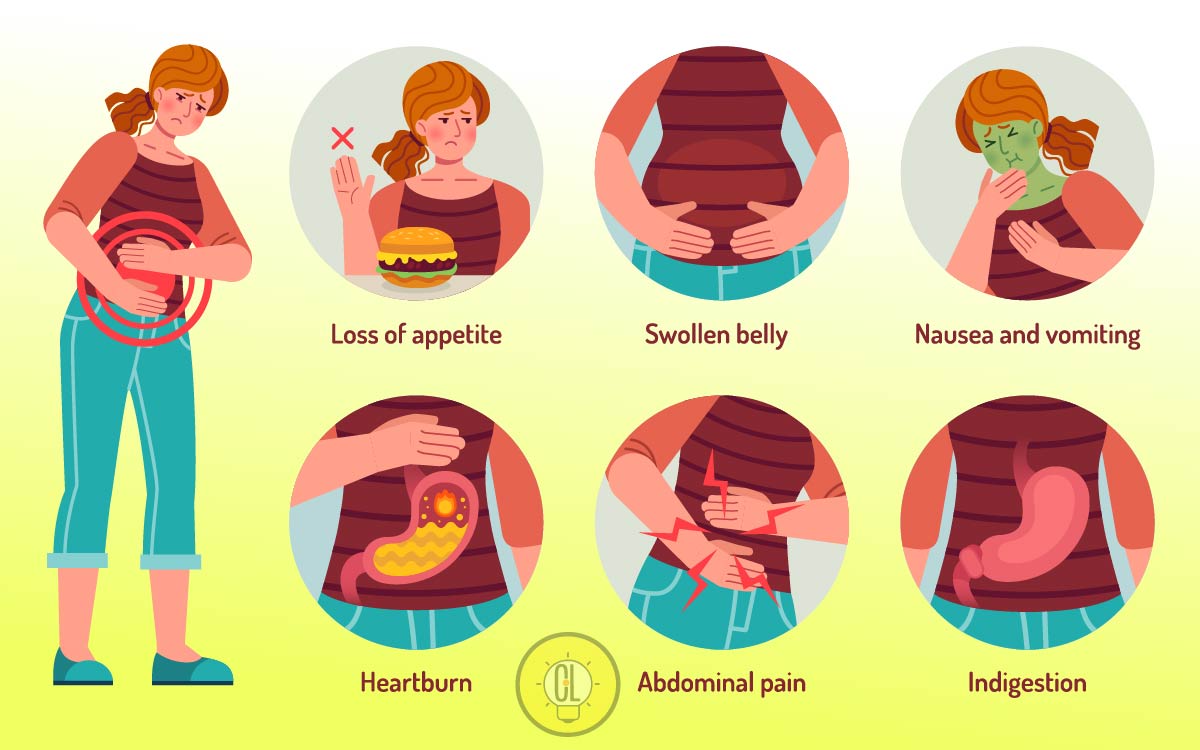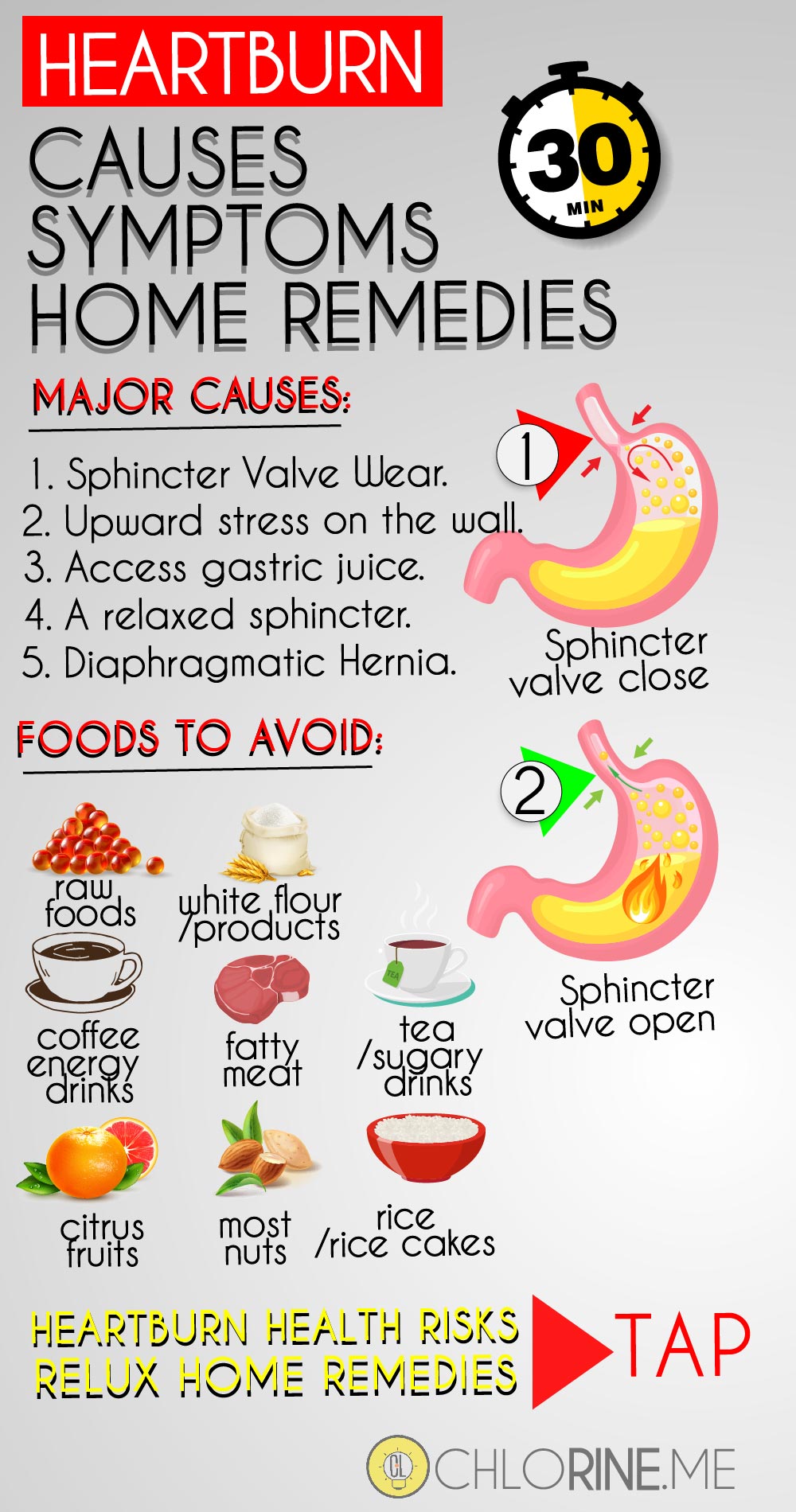Do heartburn home remedies really work? What are the symptoms, and causes of acid reflux? How to prevent reflux? What is the difference between GERD and NERD? Is heartburn in children treated differently? We will discuss all these in this post.
Heartburn or acid reflux or GERD (Gastroesophageal reflux disease) is caused by the rise of stomach acid up the esophagus. Because the lining of the esophagus is not particularly designed to resist acid, this causes a burning pain behind the sternum and acidic burping.
What Actually Causes a Heartburn?
Strictly speaking, heartburn is not a disease, but a symptom. It is one of the most common health complaints. Heartburn occurs when the gastric acid produced in the parietal cells of the gastric mucosa rises through the stomach mouth (cardia) back into the esophagus.
A sphincter muscle between the esophagus and stomach ensures that the food slips through from top to bottom, but not flow back again. If this valve doesn’t close properly, the acidic contents of the stomach can enter the delicate esophagus and cause the painful symptoms
The acid may seep up into the esophagus due to the following reasons:

1. Sphincter Valve Wear & Tear
The sphincter muscle can wear out over the course of life. While this is not the common cause of heartburn, it still affects some people.
2. Upward Stress on the Valve
A tightly filled stomach, obesity, and pregnancy can also cause reflux. When the tightness in the abdomen pushes the stomach contents back up again, chime seeps into the esophagus.
3. A relaxed Sphincter Valve:
Certain internal and external conditions make the sphincter valve relax. A relaxed sphincter can easily allow the stomach content to flow back.
Excess alcohol consumption, stressful conditions, and hormonal changes during pregnancy relax the esophageal sphincter and thus promote the reflux of gastric acid.
4. Excess Gastric Acid Production
Another common cause of heartburn is excess acidity in the stomach. Besides a variety of foods that trigger acid production in large quantities, stress, and anxiety make the stomach cramped, and acid production increases.
5. Organic Causes of Acid Reflux
Besides the abovementioned causes, there are also organic causes of reflux. The organic causes range from congenital defects, such as muscle weakness, to diseases such as an irritable stomach, inflammation of the esophagus, to anatomical disorders.
The most common organic trigger is the Diaphragmatic Hernia. In a diaphragmatic hernia, the transition from the esophagus to the stomach runs through the diaphragm. If the point of the passage is widened, it is called a break. A diaphragmatic hernia is caused, for example, by being overweight and can cause the cardia to open and stomach contents to flow upwards.
Symptoms: How do You Recognize Heartburn?
While the primary symptoms of heartburn are more than obvious, certain other symptoms also usually accompany it. For some reason, if you don’t feel the burning sensation and still want to know if it’s heartburn, you may want to look for the following symptoms:

- Acid regurgitation.
- Burning pain behind the breastbone.
- Pain in the middle-upper abdomen after eating.
- Stomach discomfort after eating.
- Discomfort worsens when bending over and lying down.
- Pain and burning when swallowing.
- Lump feeling in the throat.
- Hoarseness and cough.
- Nausea and vomiting.
- Bloating.
Heartburn Treatments: Frequent and Intense Reflux?
Treatment for heartburn depends on the cause, frequency, and extent of the symptoms. Those who suffer occasionally may simply apply certain home remedies listed below or acid-binding medication.
If you have more frequent heartburns, you should see a doctor within four weeks at the least. For intense acid reflux, doctors mirror the esophagus, stomach, and duodenum and find the actual cause.
Your doctor may advise/perform the following treatments:
1. Changes to the Diet
If your diet is found to be the major culprit, doctors will advise you to make changes. If you are on your own, watching closely when heartburn occurs and identify the trigger.
This will enable you to avoid foods that create an acidic imbalance in your stomach. You may, however, need a little patience to figure out the right diet. Observe when discomfort occurs. One handy way is to keep a food diary where you enlist foods that you need to avoid.
2. Possible Medication
While Acid Binders generally work, they only relieve lighter symptoms. Those who suffer from chronic heartburns may need to take Proton Pump Inhibitors instead.
PPIs are drugs that reduce acid production in the stomach by inhibiting the responsible proton pumps in the parietal cells. Although the drugs generally considered tolerable, they are not free of side effects. Among other things, they may cause temporary gastrointestinal problems. Therefore, for frequent and intense GERD, you should look out for long-term therapy with medication under medical supervision.
3. Heartburn Caused by Another Illness
Your particular acid reflux may also be caused by another illness such as an irritable stomach or inflammation of the esophagus. It is, therefore, important that you consult a medical professional in time.
4. Anatomically Caused Reflux
While it is rare, it is still possible that your heartburn may be due to the physical structure, placement of your esophagus and stomach. In such cases, surgical reconstruction of the cardia may be needed. This operation improves the closing function of the cardiA so that stomach contents can no longer rise into the esophagus.
Heartburn Home Remedies
If your heartburn is not frequent and anatomical, you can treat it without even leaving your home. Please note that the home remedies below are not arranged in priority order, you may try any of the remedies you want.
Below are all the great home remedies you can implement to relieve the symptoms almost instantly:
1. Chewing Gum (For mild reflux)
Intensive chewing of chewing gum stimulates the formation of saliva. As saliva is basic in nature, it neutralizes the acid in the esophagus. The type of chewing gum does not matter.
If you are sensitive to peppermint and methanol, you may avoid this remedy.
2. Fennel, Caraway, or Chamomile Tea
Herbal teas containing fennel, caraway, or chamomile is a simple way to treat heartburns. Taking a cup of herbal tea after meals can wash down the stomach acid. Additionally, it also dilutes the gastric juice.
3. Potatoes and Potato Juice
In acute cases, a piece of boiled potato or pressed potato juice can help. The juice binds excess stomach acid and soothes heartburn. To do this, press several raw potatoes in the juicer or buy ready-made at the pharmacy. It is advisable to drink about 100 milliliters of the tuber juice in small sips before meals.
4. Roll Cure (Slow and gradual)
The aim of a roll cure is to moisten as much of the gastric mucosa as possible with healing fluid. Chamomile tea or potato juice is suitable for this.
On an empty stomach, take a few sips and lie on your back. After five minutes, drink again and turn on your right side. After another five minutes, switch to the prone position and then to the left side. Repeat this every day for at least a week.
5. Sauerkraut For Reflux
Some forks of raw sauerkraut are also a tried and tested home remedy for the painful burning sensation. But be careful as eating raw sauerkraut can lead to flatulence.
Oatmeal: A few tablespoons of the grain will absorb the excess acid.
6. Bananas Can Help
Bananas are rich in mucilage and can form a thin protective layer against the acid. Eat a banana in small bites with proper chewing for some relief.
7. Other Foods For Heartburn
Nuts (almonds, cashew nuts, hazelnuts), seeds (pumpkin seeds, sunflower seeds), peeled cucumber, rusks, dry bread, rice, or rice cakes can also relieve heartburn. Try a couple of them and see if this helps.
8. Foods to Avoid (Rule of thumb)
- Raw food cooked vegetables.
- White flour products whole grain products.
- Coffee and energy drinks.
- Oat or almond milk, tomatoes, oatmeal.
- Fatty meat or sausage lean meat.
- Carbonated drinks silent Waters.
- Mint tea, black and green tea Herbal teas (chamomile, caraway, fennel).
- Strongly seasoned, salted, or spicy foods Nuts and seeds.
- Fruit juices and sodas Rice and rice cakes.
- Sour fruits (citrus fruits) contain citric acid.
9. Healing Earth Remedy
Healing Earth is a mineral-containing powder that also binds excess stomach acid. Simply stir one to two teaspoons of healing earth into a glass of non-carbonated water and drink it. Get your healing earth from the pharmacy or drugstore.
10. Baking Powder for Instant Relief
Baking powder or baking soda has a similar effect to healing the earth. Sodium hydrogen carbonate (NaHCO3) neutralizes gastric juice.
Simply dissolve a teaspoon of baking powder in a glass of water and drink in small sips. Please keep in mind not to overdo it as this may backfire. When baking soda is dissolved in water, it releases carbon dioxide. Carbon dioxide in turn combines with water to form Carbonic acid (H2CO3) which can even intensify the reflux and may also lead to unpleasant flatulence.
Related: 10 Ways to Treat Acid Reflux: Heartburn Remedies
GERD: Consequences of Heartburn
Occasional heartburn is usually harmless. Constant heartburn over a long period of time, on the other hand, should not be taken lightly. If the symptoms occur several times a week, you should definitely consult a doctor.
While the stomach has a protective layer against the aggressive hydrochloric acid, the esophagus is at its mercy. Persistent reflux disease can therefore lead to severe inflammation of the esophagus and even esophageal cancer.
Difference Between NERD and GERD
NERD (Non-erosive reflux disease): The esophagus is inflamed, but not further damaged.
GERD (Gastroesophageal reflux disease): A pathological change in the esophageal mucosa has happened. A so-called Barrett’s mucosa membrane forms. This is an adaptation process with which the mucous membrane tries to protect itself from the corrosive stomach acid.
The larger Barrett’s mucous membrane and the more cell nests that are formed, the greater the risk of developing esophageal cancer. How far the mucous membrane has already been damaged can only be seen through a gastroscopy.
Heartburn Prevention: Effective Tips For Reflux
Eat slowly and chew thoroughly: This is how enough saliva gets into the chyme. It contains enzymes that are crucial for breaking down food into its components.
Eat several small meals a day: Large portions put a strain on the stomach. In addition, the pressure on the muscle that seals the esophagus is reduced and the reflux of acidic stomach contents is made more difficult.
Avoid late-night munching: The last meal should be eaten three to four hours before bedtime. If there is a celebratory meal, it is best at noon.
Exercise is good after eating: Instead of lying down, you should rather take a digestive walk.
Reduce acid loosener: These include caffeinated and carbonated drinks. You should also avoid very fatty, sweet, sour, spicy, and spicy foods.
Avoid/reduce alcohol consumption: Alcohol stimulates the production of acid in the stomach and is, therefore, an acid loosener. In addition, alcohol also relaxes the muscle between the esophagus and stomach, which acts like a valve to prevent stomach acid from rising.
No cigarette after eating: If you are prone to heartburn, you should avoid the cigarette after eating. Nicotine stimulates acid production and weakens the muscles of the esophagus, which are supposed to prevent stomach acid from flowing back into the esophagus.
Elevate your upper body while you sleep: If you experience nighttime symptoms, it helps to elevate your upper body to prevent backflow from the stomach.
Comfortable clothing: Clothing that is too tight increases the pressure on the abdomen and promotes reflux.
Manage stress, anxiety: Excitement and hectic pace literally hit the stomach. With meditation and yoga, you are not only doing something good for your soul, but also for your body.
Heartburn in Children: How to Manage?
Obesity and an unhealthy diet can also lead to heartburn in children and adolescents. About 2 to 10 % of children worldwide are regularly affected by heartburn.
Dr. Ulrich Fegeler from the professional association of pediatricians in Cologne explains that In addition to chest pain, a bitter taste in the mouth, hoarseness, difficulty swallowing, the feeling that the food is stuck in the throat, or a dry cough can be signs of heartburn in children.
As a rule, a change in diet and lifestyle is sufficient. For instance, fatty and fried foods should no longer be on the children’s menu, just like citrus fruits and drinks, tomatoes, chili peppers, and black pepper. Because they irritate the sensitive esophagus unnecessarily, says Fegeler.
Other things that may help are to make sure that the children eat slowly and chew well. If children chew gum after eating, this stimulates the production of saliva, which neutralizes the acid more quickly. A glass of lukewarm water or herbal tea after a meal has a similar effect. If none of these measures help, you may need to see a doctor.

Disclaimer: This information is in no way a substitute for professional advice or treatment by trained and recognized doctors. The contents of Chlorine cannot and must not be used to independently make diagnoses or start treatments.
